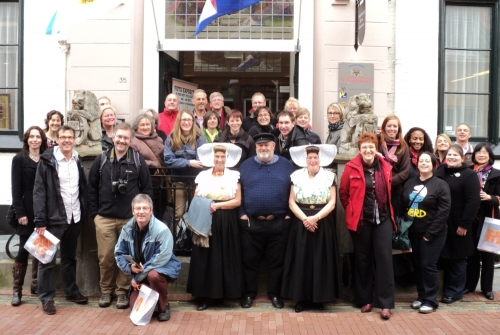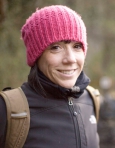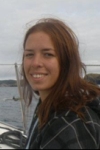
Klik op een partner-organisatie voor meer informatie over de teamleden.
|
|
Dr Tim AcottDr Tim Acott is a principal lecturer in Environmental Geography at the University of Greenwich. He is currently the principal investigator on a €4.6 million ERDF co-financed Interreg IVa project called Geography of Inshore Fishing and Sustainability (GIFS). Tim was also the lead investigator for the University of Greenwich on a European INTERREG 4a funded collaborative project, CHARM III(Channel Integrated Approach for Marine Resource Management). Tim research has recently focused on understanding the social and cultural importance of marine fishing although he has worked on many social science research projects spanning, environmental ethics, environmental conservation and sustainable tourism.
|
|
|
Dr Julie UrquhartDr Julie Urquhart graduated with a First Class BSc Hons in Environmental Science from the University of Greenwich. She gained a distinction in a MA in Research Methods (for Countryside Planning) and completed her PhD in forest policy and economics in at the Countryside and Community Research Institute (University of Gloucestershire) in 2009. She joined the School of Science at the University of Greenwich in 2009 to work on the INTERREG 4a CHARM III (Channel Integrated Approach to Marine Research Management) project, investigating the contribution of marine fishing to sense of place and identity in coastal communities on both sides of the English Channel. She has also worked on contracts for Defra, English Heritage and the Forestry Commission in areas such as the social impacts of marine fishing, economic evaluation of heritage in National Parks, and woodland management and public good outputs. She is currently a Senior Research Fellow and co-investigator of the GIFS project. |
|
|
Michaela KennardMichaela Kennard has a BSc in Animal Science from Writtle College and a MA in Town & Country Planning from the University of the West of England. Before joining the GIFS team she worked at the Environment Agency in the UK for 12 years, firstly as a Freshwater Ecologist and then as a Senior Planning Liaison Officer, where she advised on aquatic environmental impacts and negotiated compensation and mitigation projects for major developments in London and Kent. Since April 2012 she has been conducting research for her PhD at the University of Greenwich. Her work will explore the socio-cultural values and inter-relationships of inshore fishing, community identity and tourism.
|
|
|
Dr Minghua ZhaoMinghua Zhao is a maritime sociologist, deputy director of Greenwich Maritime Institute (GMI), and Director of the China Maritime Centre within the University of Greenwich. Her research covers various aspects of maritime policy, especially the seafarer labour market; welfare, work and living conditions; gender issues in shipping and fisheries. Her publications on gender issues in shipping and fisheries include: ‘Women as Visible and Invisible Workers in Fisheries: Findings in Northern England’ (2012); Women in Fisheries (2010); Women Seafarers: Global Employment Policy and Practices (co-author, 2003). At GMI, she teaches postgraduate courses for the MA International Maritime Policy. She supervises MPhil/PhD students whose research covers cruise shipping, oil pollution, seafarers labour market, port security, green ship breaking and seafarer’s rights. For the GIFS Project she is leading the activity ‘Women and Social Cohesion in Coastal Communities’.
|
 |
Suzanne LouailSuzanne Louail joined the Greenwich Maritime Institute in 2004 where she is the Academic and Research Manager. As well as managing the GMI office she contributes to all aspects of the Institutes’ development. She also oversees recruitment, marketing, admissions, assessment, external relations and project manages the various international conferences, symposiums, public lectures/seminars and other events that the GMI hosts. She is on the directorate for the London Universities Maritime Law & Policy Group and the China Maritime Centre and is Secretary to the Greenwich Forum. For the GIFS Project Suzanne is the Project Co-ordinator and Communications Manager. |
|
|
Esther CopeteEsther Copete joined the Greenwich Maritime Institute in 2012 as a research student for three years on the GIFS project. She is researching women’s contribution to social cohesion in fishing communities. Esther has a BSc in International Relations (dissertation title: “The Maritime Fishing Cooperation in the Basin of the Pacific Ocean”) and an MA in Maritime Policy (GMI), for which she researched port development in developing countries. Prior to joining GMI Esther has taken part in coastal community development projects in Colombia and the Comoros Islands. She was also selected by the Japanese International Co-Operation Agency to participate in a fully funded training course on the educational aspect of environmentally sustainable coastal community development in Okinawa, Japan. Her internship and subsequent work with the International Maritime Organization in London focused on the legislative aspect of maritime and marine environmental policy.
|
 |
Samer BagaeenDr. Samer Bagaeen is a chartered town planner and chartered surveyor. He studied architecture and planning at University College London. He joined the University of Brighton in 2008 to lead the University of Brighton Planning School. He currently serves on the Policy Council of the Town and Country Planning Association in London and on the General Assembly of the Royal Town Planning Institute. He had previously worked in Jerusalem as the Old City’s Master Plan Coordinator and currently act as the visiting professor of real estate in Lima, Peru. With a long term interest in sustainable urban regeneration, he has investigated the re-use of former defence sites in the UK and is currently investigating options for army sites in Romania. He co-edited Gated Communities: Social Sustainability in Contemporary and Historical Gated Developments (Routledge, 2010) and contributed to Dimensions of the sustainable city (Springer, 2010). He is currently undertaking research on key themes driving and affecting tourism development in urban areas. |
|
|
Professor Andrew ChurchAndrew Church is Professor of Human Geography in the School of Environment and Technology, University of Brighton. His research is in humangeography with a focus on human-nature relationsand the environmental, political and spatial aspects of leisure and tourism. He has extensive experience in using a range of qualitative research methods in academic research and also in formal public consultations undertaken for government bodies that have involved a wide range of stakeholders. He has been involved in range of community-university engagement activities and has been the Co-Academic Director of the University of Brighton’s award winning Community University Partnership Programme (CUPP). He has a strong track record of funded research for a range of government organisations with environmental policy responsibilities including Defra, Countryside Agency, Countryside Council for Wales, British Waterways, Forestry Commission, Ordnance Survey and local councils. Research for the Environment Agency has resulted in significant strategic and local changes in government policy on access to water and water related recreation. He is also involved in two other EU funded projects (Aquamancheand Greenspace) where he is responsible for leading stakeholder engagement activities He adopted a similar role on the INTERREGGROW project RELEMCOM(Reclaiming Land Empowering Communities).Andrew has been an adviser to the House of Commons Employment Committee and is currently a coordinating lead author on the Defraexpert panel for the UK National Ecosystem Assessment with responsibility for the chapter on cultural ecosystem services in the world’s first national level ecosystem assessment. |
 |
Dr Jo Orchard-WebbJo Orchard-Webb’s research focuses on the role of citizen engagement and urban governance in constructing/ obstructing social sustainability. Since completing her PhD in 2012 - [Titled: Social dimensions of urban regeneration: discourses, policies and practices of social sustainability in Hastings, England] – she has been working at the University of Leeds within the inter-disciplinary ‘Building Sustainable Societies’ project as a Research Fellow in Social Sustainability. Her focus has been on writing papers out of the doctorate and collaborating with other projects, including GIFS, to further explore the concept (and politics) of social sustainability in the context of austerity localism, community governance and new practices of political participation. |
 |
Bertrand Le GallicBertrand Le Gallic is a Senior Associate Professor in economics at the University of Western Brittany. He has studied fisheries economics for many years and especially fisheries economic issues within the Channel area. He is specialized in fisheries bioeconomic modeling and sustainable management. From 2002 to 2005 he has been administrator at the Organization for Economic Co-operation and Development (OECD) for the direction of Food, Agriculture and Fisheries. In 2005 he joined the UMR AMURE research unit within which he has conducted various research projects. He is also the vice-president of the European Association of Fisheries Economists (EAFE). |
 |
Myriam RobertMyriam Robert studied fisheries economics and management. She has the Master Marine and Coastal Sciences mention economy co-accredited Agrocampus Ouest and University of Western Brittany. This formation gives understanding of concepts and tools needed to treat economic issues related to the fishing sector, marine and coastal environment. These concerns are at the center of strategies for sustainable development of human activities using natural resources in the production process. In 2012 she joined the research unit UMR-AMURE associating the Marine Economics Department of Ifremer and the Centre for the Law and Economics of the Sea of the University of Western Brittany.
|
 |
Myriam NourryMyriam Nourry is an Associate Professor in economics at the University of Western Brittany since September 2010, after obtaining her PhD. Her research in environmental economics deals with the relationship between economic growth and the state of the environment. In her thesis, she developed four applied papers on this theme concerning the environmental Kuznets curve, indicators of sustainable development and CO2 emissions dynamics. She is able to seek data and manage databases, but also to use panel data and time series methods. In September 2010, she also joined the research unit UMR AMURE and shares her statistical and econometric skills with other researchers working on fisheries economic issues. |
|
|
Marie LesueurMarie Lesueur is a fisheries’ scientist within the Fisheries and Aquatic Sciences Centre – AGROCAMPUS OUEST. She is in charge of the coordination and execution of projects, relations with external partners/contacts in the fisheries’ industry and other interested parties. Areas of interest include fisheries’ activities, fisheries’ economics, data-processing tools (e.g. on-line atlas), and valuation of seafood products. My page : http://halieutique.agrocampus-ouest.fr/personnes.php?idpers=13&idlang=
|
|
|
David Picault David is Picault is a research officer in Fisheries and Aquatic Sciences Center at AGROCAMPUS OUEST Rennes, since October 2013. Graduated from AGROCAMPUS OUEST (2008), he is specialized in fishery, especially in the add value of fish products and fisheries management. He acquired an experience in this area thanks to positions within the fisheries administration (DPMA) and an international consultancy in fisheries, aquaculture and marine environments (COFREPECHE). Currently, he works for the GIFS project and in particular on axis 1 "Coastal zone governance and inshore fishing " and axis 3 "Economy and regeneration in fishing communities".
|
|
|
Mélody LeplatMélody Leplat has been an Assistant Professor in Economics at France Business School in Brest since March 2010. She specialises in environmental economics and more precisely in the valuation of non-marketed goods by stated and revealed preference methods. She belongs to the research unit SMART. This research unit gathers researchers from the French National Institute for Agricultural Aesearch (INRA) and from Agrocampus Ouest. It is devoted to the analysis and evaluation of public policies in the fields of agriculture, the food industry and the environment.
|
|
|
Carole Ropars-ColletCarole Ropars-Collet has been an Associate Professor in Economics at Agrocampus Ouest in Rennes since 2002. Her research topics deal with natural resource economics, mathematical bioeconomics, and with valuation of market and non-marketed goods by stated and revealed preference methods. She belongs to the research unit SMART, gathering researchers from the French National Institute for Agricultural Research (INRA) and from Agrocampus Ouest. This research unit is devoted to the analysis and evaluation of public policies in the fields of agriculture, food industry and environment. |
 |
Dr Ann-Katrien LescrauwaetAnn-Katrien Lescrauwaet studied zoology (University of Ghent) and Management of Protected Landscapes (University of Wales). She obtained a PhD degree in Marine Sciences at the UGhent, on the topic of Marine Historical Ecology and Fisheries. After her studies she was engaged in almost 20 years of fieldwork in the conservation and protection of marine ecosystems. She worked on these topics in Peru, Venezuela, Azores and Chile, in particular on small cetaceans and the interaction with artisanal fisheries. In 2004 she joined the Flanders Marine Institute, where she is employed as head of the 'Policy Information Division' since 2007. This team of 6 people supports an Integrated Maritime Policy and Coastal Zone Management by strengthening the interaction between marine scientific knowledge and policy and by actively supplying policy-relevant scientific information. With the project "A century of sea fisheries in Belgium” (since 2007) VLIZ describes historical published sources, makes them accessible and integrates historical data of sea fisheries in Belgium, the North Sea and wider areas of interest. Dr. Lescrauwaet is also co-chairing the current ICES Working Group on the History of Fish and Fisheries. |
 |
Marleen RoelofsMarleen Roelofs studied Marine and Lacustrine Sciences (University of Ghent). For her master thesis she studied the functional and structural responses of harpacticoid copepods to anoxia in the Northern Adriatic. After her master she followed a specific teacher's training in Biology (University of Ghent) and started working as scientific assistant in the library of the Flanders Marine Institute in October 2012. Since March 2013 she is working for the GIFS project.
|
|
|
Jack DoomsJack Dooms studied at Hogeschool Zeeland. He has great experience in international cooperation, especially housing issues and development planning process in rural area in South Africa. He worked as operational managerial Accommodation & Grants for the Municipality of Vlissingen. Since 2009 he works as policy Advisor Economic Affairs for the Municipality of Middelburg. He is also involved in the GIFS project.
|
|
|
Tiny MaenhoutTiny Maenhout is Strategic project manager Tourism and Recreation with specialization in EU programs. She works for the municipality of Sluis and municipality of Middelburg where she is involved in the GIFS project, in particular with the 'Arnemuiden' case study. GIFS tries to transform the maritime/fisheries past of Arnemuiden into new economic opportunities in the tourism sector of the fishing village.
|